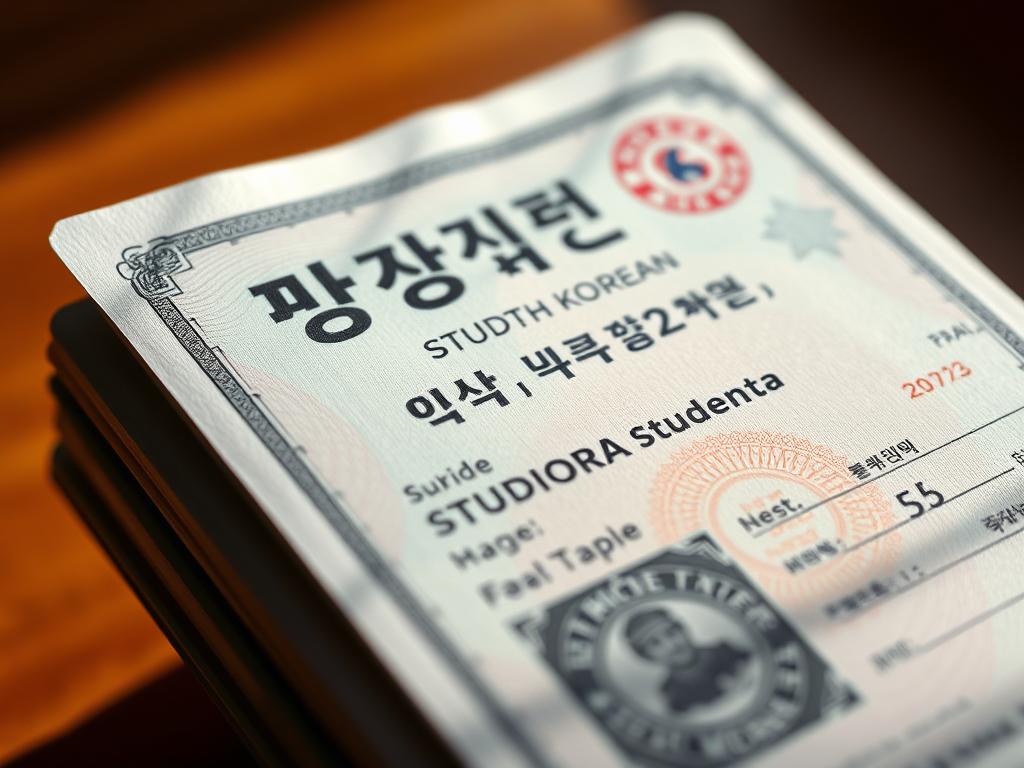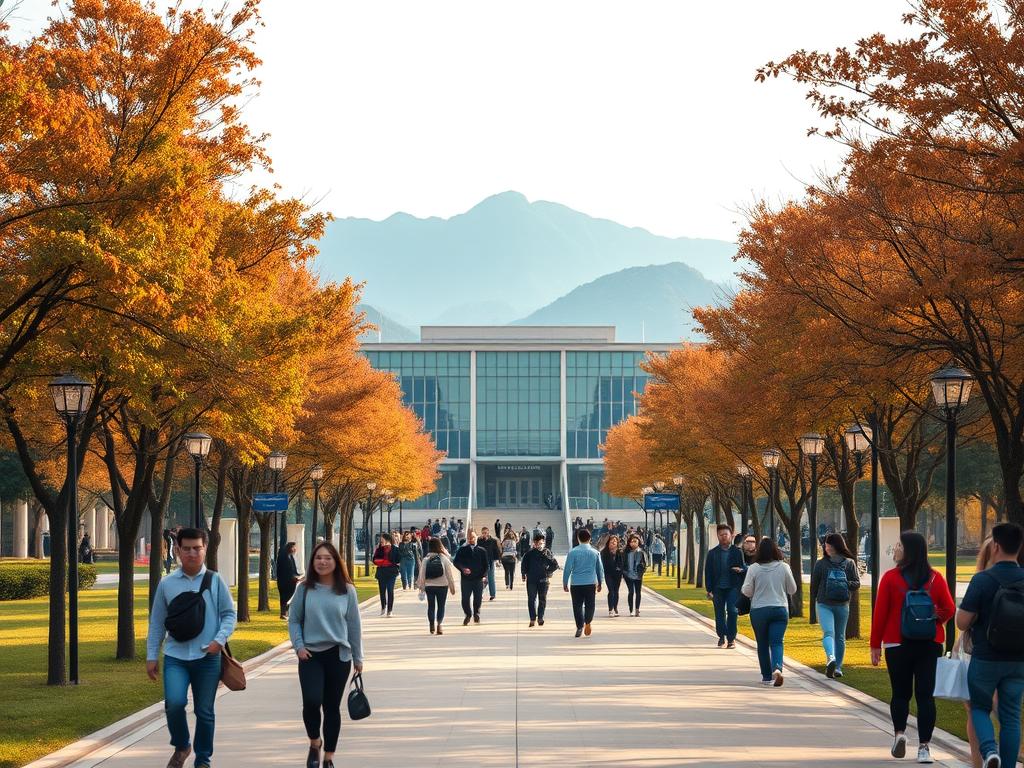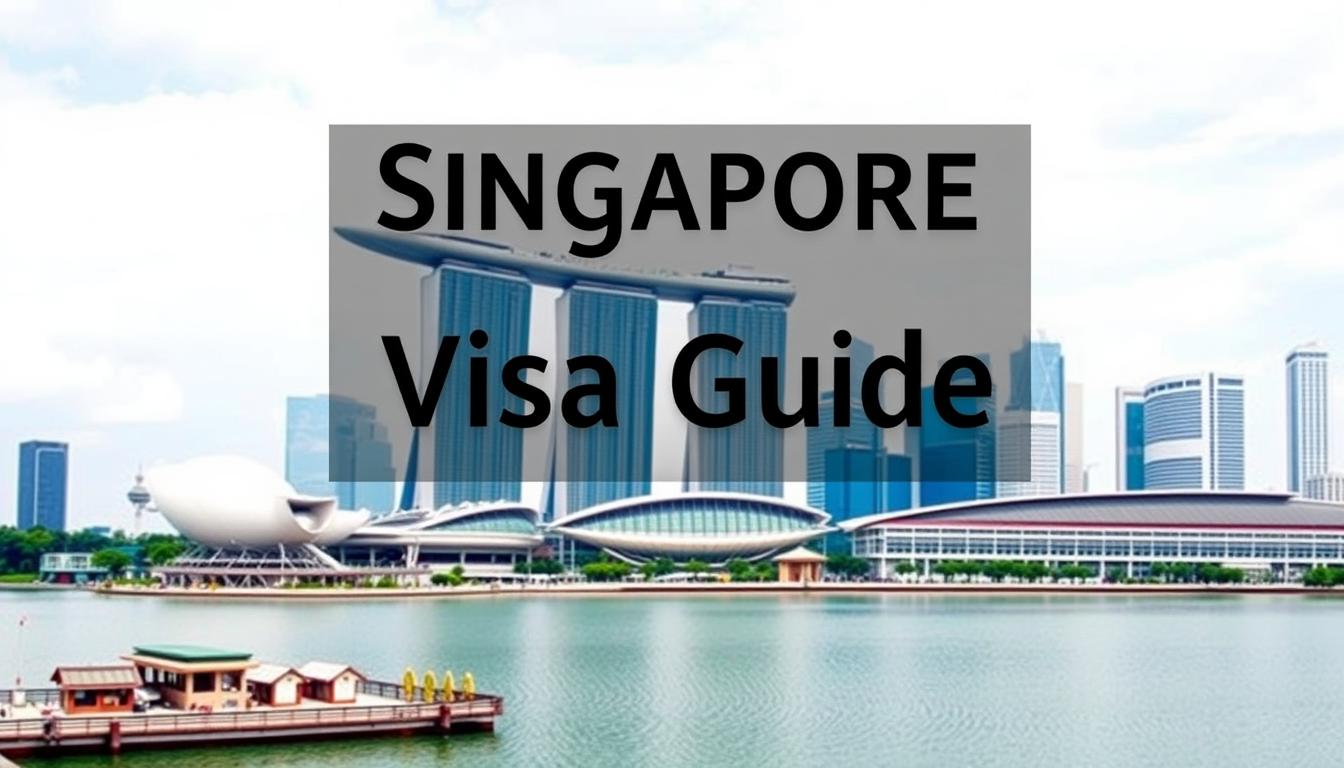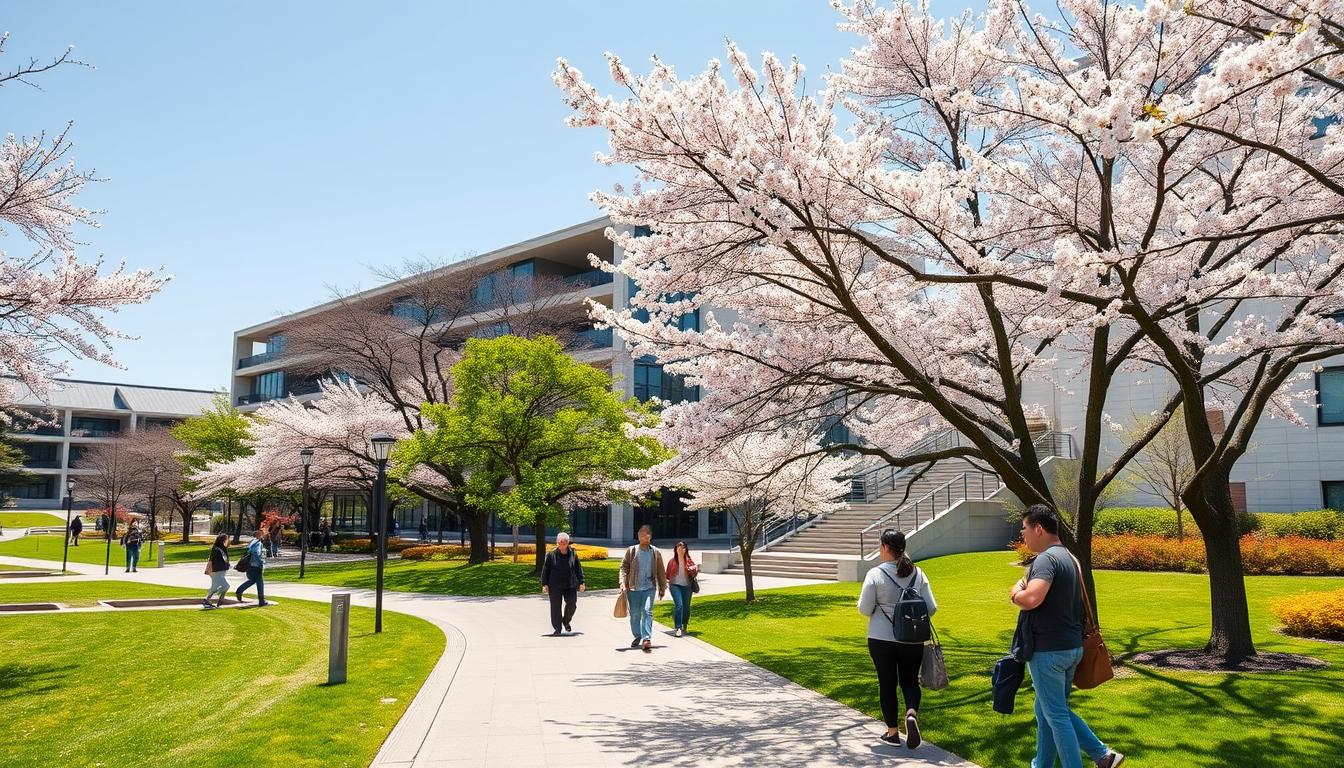Students from Pakistan might find South Korea appealing for higher education. It has top universities and a rich culture. This mix of academic quality and personal growth is unique.
Getting a study visa for South Korea is detailed. This guide covers the admission process, scholarships, tuition, work, and settling down. It’s all you need to know for international students.
Key Takeaways
- Eligibility criteria for a South Korea study visa
- Top universities and programs for international students
- Available scholarships and financial aid
- Part-time work opportunities for students
- Post-study settlement options in South Korea
Overview of South Korea's Education System
The South Korean education system is known for its high standards and creative learning methods. It focuses a lot on education, making it a top place for learning and research.
As a famous education expert once said,
“South Korea’s education system is a model for other countries due to its rigorous standards and emphasis on science, technology, engineering, and mathematics (STEM) fields.”
This praise is seen in its high rankings worldwide.
Global Ranking and Recognition
South Korean universities are among the best globally. Seoul National University is a top university in Asia and is known for its research and programs.
Types of Higher Education Institutions
South Korea’s higher education offers many choices. You can find research universities, technical schools, and liberal arts colleges.
Research Universities vs. Technical Institutions
Research universities in South Korea are all about studying and offering many programs. Technical schools focus on teaching practical skills in areas like engineering and technology.
Both kinds of schools are important in South Korea’s education. They help students get ready for the world by mixing theory and practice.
Why Choose South Korea for Higher Education
South Korea’s education system is known for its high standards, rich culture, and job opportunities. This mix attracts students from all over, especially those from Pakistan.
Academic Excellence and Innovation
South Korean universities are known worldwide for their cutting-edge research and tough academic programs. They focus a lot on STEM fields, leading to big strides in many industries. Innovative research facilities and partnerships with schools around the world make learning even better.
Cultural Experience and K-Wave Influence
Going to school in South Korea is more than just studying; it’s a chance to dive into a vibrant culture. The K-wave, with its K-pop and dramas, has made people interested in Korean language and traditions. Being part of this lively culture helps students really get to know Korean society.
Career Opportunities for Pakistani Graduates
Graduates from South Korean schools have many job options, both in Korea and abroad. The Korean government helps international students find work, with things like work permits and job fairs. Pakistani graduates can use their Korean language skills and cultural knowledge to get jobs in different fields.
| Benefits | Description |
|---|---|
| Academic Excellence | Innovative research facilities and global recognition |
| Cultural Experience | Rich cultural immersion and K-wave influence |
| Career Opportunities | Work permits, job fairs, and international career paths |
South Korea Study Visa Guide: Admission, Scholarships, Fees, Work & Settlement
Studying in South Korea can change your life. It offers top universities, cultural experiences, and scholarships. It’s becoming a favorite spot for students from around the world.
Comprehensive Pathway for Pakistani Students
Pakistani students have a clear path to study in South Korea. First, they pick the right university and program. Then, they meet the admission needs and apply for a study visa.
The admission process requires academic records, language test scores, and letters of recommendation. Some schools might ask for entrance exams or interviews too.
Key Steps in the Admission Process:
- Research universities and programs
- Check eligibility criteria
- Prepare and submit required documents
- Apply for a study visa upon receiving an admission letter
Recent Policy Changes Affecting International Students
South Korea has made changes to draw more international students. These include easier visa processes, more scholarships, and better support for students.
| Policy Change | Description | Impact on International Students |
|---|---|---|
| Simplified Visa Procedures | Streamlined application process for study visas | Easier and faster visa processing |
| Increased Scholarship Opportunities | More scholarships available for international students | Financial assistance for tuition and living expenses |
| Enhanced Support Services | Improved support for language, cultural, and academic integration | Better adaptation to life in South Korea |
These changes show South Korea’s goal to be a top education center. It aims to welcome international students warmly.
Types of Student Visas for South Korea
The South Korean government offers different student visas for international students. It’s important for Pakistani students to know about these visa types before studying in South Korea.
D-2 Visa for Degree Programs
The D-2 visa is for students in degree programs at South Korean universities. It’s perfect for those getting undergraduate or graduate degrees. To get a D-2 visa, you need to be accepted by a recognized South Korean school and meet certain academic and language standards.
D-4 Visa for Language Courses
The D-4 visa is for students in language courses, like Korean language programs. It’s great for improving your language skills or for cultural experiences.
Other Relevant Visa Categories
There are more visa types for international students. For example, the D-10 visa is for job seekers, which might be useful after studying. Knowing about these options helps students plan their stay and career in South Korea.

Eligibility Requirements for South Korean Student Visa
The South Korean government has set certain rules for Pakistani students to get a student visa. These rules help ensure students are ready for their studies and can support themselves in South Korea.
Academic Requirements and Qualifications
Pakistani students need a strong academic background to get a South Korean student visa. They must have finished their previous degree, like a high school diploma for undergraduate studies. The exact requirements depend on the school and program they’re applying to.
Financial Requirements and Proof of Funds
Students must show they have enough money for tuition, living costs, and other expenses in South Korea. The amount needed can change, but usually, it’s for at least one year.
| Expense Type | Estimated Annual Cost (KRW) | Estimated Annual Cost (PKR) |
|---|---|---|
| Tuition Fees | 5,000,000 – 10,000,000 | 800,000 – 1,600,000 |
| Living Expenses | 12,000,000 – 18,000,000 | 1,920,000 – 2,880,000 |
| Health Insurance | 1,000,000 – 2,000,000 | 160,000 – 320,000 |
Health and Insurance Requirements
Students must have health insurance that covers them in South Korea. They might need to take specific medical tests, especially if they’re from Pakistan.
Required Medical Tests for Pakistani Students
Pakistani students might need to take a tuberculosis test and a general health check. These tests are part of the visa application. It’s important to check with the South Korean embassy or consulate for exact requirements.
Step-by-Step Visa Application Process
For Pakistani students, getting a study visa for South Korea is key to higher education. The process has several important steps. These must be followed carefully for a successful application.
Document Preparation and Authentication
The first step is to prepare and authenticate your documents. You’ll need:
- Passport: Make sure it’s valid for at least six months after your stay in South Korea.
- Admission Letter: Get an official letter from your South Korean university.
- Academic Documents: Have authenticated copies of your transcripts and degree certificates.
Document Legalization Process in Pakistan
Academic documents need legalization. This means getting them verified by Pakistan’s Higher Education Commission (HEC) and Ministry of Foreign Affairs.
Application Submission Procedures
After preparing your documents, it’s time to apply for your visa. Here’s what to do:
- Fill out the visa application form correctly and fully.
- Submit your documents, like your authenticated academic papers and admission letter.
- Pay the visa application fee.
Visa Interview Tips and Common Questions
A visa interview is a big part of the process. To do well, prepare by:
- Practicing common interview questions, like why you chose South Korea for your studies.
- Dressing professionally and being ready to show your documents.
- Being honest and clear in your answers.
By following these steps and being well-prepared, Pakistani students can better navigate the South Korean study visa application process.
University Admission Process in South Korea
For Pakistani students, understanding the admission process for South Korean universities is crucial. It involves several key steps, from researching universities to submitting required documents.
Researching Universities and Programs
The first step is to research universities and programs that fit your goals. South Korea has many prestigious institutions, like Seoul National University and Yonsei University. These offer a wide range of programs for international students.
When researching, consider the program’s curriculum, faculty, campus facilities, and location. These factors are important for your academic and career goals.
Application Timeline and Deadlines
Understanding the application timeline is vital. Most South Korean universities have two main intake periods: spring and fall. Application deadlines are usually in September for the spring semester and in May for the fall semester.
However, these dates can vary. It’s essential to check the specific deadlines for each university and program you’re interested in.
Required Documents and Entrance Tests
The required documents for admission include academic transcripts, certificates, and proof of language proficiency. This can be TOPIK for Korean-taught programs or TOEFL/IELTS for English-taught programs. Letters of recommendation are also needed.
Some programs may require entrance tests or additional assessments. Having all necessary documents ready is crucial for a smooth application process.
Credential Evaluation for Pakistani Degrees
Pakistani students need to have their academic credentials evaluated. This is to meet South Korean university requirements. The process involves verifying the authenticity and equivalence of your qualifications.
The Korean government recognizes certain credential evaluation services. It’s important to check which services are accepted by your chosen university. This step is crucial to ensure your application is processed without any issues.
Language Requirements and TOPIK Exam
Language skills are crucial for students wanting to study in South Korea. The Korean government checks if international students can speak Korean well enough. This is to help them succeed in their studies.
TOPIK Levels and University Requirements
The Test of Proficiency in Korean (TOPIK) tests how well non-native speakers can speak Korean. It has six levels, from beginner (Level 1) to advanced (Level 6).
TOPIK Levels and Their Corresponding CEFR Levels:
| TOPIK Level | CEFR Level | Description |
|---|---|---|
| Level 1 | A1 | Basic understanding of Korean |
| Level 2 | A2 | Basic communication skills |
| Level 3 | B1 | Intermediate level |
| Level 4 | B2 | Advanced intermediate level |
| Level 5 | C1 | Advanced level |
| Level 6 | C2 | Proficient level |
TOPIK Test Centers in Pakistan
TOPIK test centers are in big cities like Lahore and Karachi in Pakistan. This makes it easy for Pakistani students to take the test.
English-Taught Programs for Non-Korean Speakers
Many South Korean universities teach in English for non-Korean speakers. This is great for international students.

Universities with English programs need TOEFL or IELTS scores. This ensures international students can keep up with the lessons.
Scholarship Opportunities for Pakistani Students
Studying in South Korea can be easier for Pakistani students thanks to many scholarship programs. These scholarships help with tuition and living costs. This lets students concentrate on their studies.
Government Scholarships
The Korean Government Scholarship Program (GKS) is a top choice for international students, including Pakistanis. It pays for tuition, gives a monthly allowance, and covers airfare to and from Korea.
“The GKS program is a great opportunity for Pakistani students to experience the high-quality education system in South Korea while immersing themselves in Korean culture.”
University-Specific Scholarships
Many South Korean universities offer scholarships to international students. These scholarships are based on academic achievement, language skills, or other criteria. For example, Seoul National University gives scholarships to top international students.
| University | Scholarship Type | Coverage |
|---|---|---|
| Seoul National University | Merit-Based | Tuition Fees |
| Yonsei University | Language Proficiency | Monthly Allowance |
| Korea University | Need-Based | Tuition Fees and Living Expenses |
Pakistan-Korea Bilateral Scholarships
There are scholarships for Pakistani students through the Pakistan-Korea Bilateral Scholarship Program. These scholarships aim to increase understanding and cooperation between the two countries.
Pakistani students can find out more by contacting the Korean embassy or their chosen university’s international office.
Tuition Fees at South Korean Universities
It’s important to know how much higher education costs in South Korea. The price can change a lot based on the school and the program you choose.
Public vs. Private Universities Cost Comparison
In South Korea, you can go to public or private universities. Public schools usually cost less, with lower tuition fees than private ones.
| University Type | Average Tuition Fee (per year) |
|---|---|
| Public Universities | $3,000 – $5,000 |
| Private Universities | $6,000 – $10,000 |
Program-Specific Fee Structure
The cost also depends on the program you’re in. Some programs cost more because they need special equipment and facilities.
STEM vs. Humanities Programs
STEM programs, like science and engineering, cost more. This is because they need advanced tools and labs. Humanities programs, like languages and history, are usually cheaper.
| Program Type | Average Tuition Fee (per year) |
|---|---|
| STEM Programs | $5,000 – $8,000 |
| Humanities Programs | $3,500 – $6,000 |
Knowing these differences helps you make a better choice about studying in South Korea.
Cost of Living in South Korea
For international students planning to study abroad, knowing the cost of living in South Korea is key. Expenses can change based on lifestyle, location, and personal choices. This section gives an overview of typical living costs in South Korea.
Accommodation Options and Costs
Accommodation is a big expense for students. Prices differ based on whether you choose university dorms or private housing.
University Dormitories vs. Private Housing
University dorms are a convenient and affordable choice, costing ₩500,000 to ₩1,000,000 (about $400-$800 USD) monthly. Private housing, like shared apartments or studios, can cost ₩800,000 to ₩2,000,000 ($650-$1,650 USD) monthly. Choosing the right accommodation depends on budget and personal preference.
Food and Transportation Expenses
Food costs in South Korea can vary a lot. Eating out can cost ₩3,000 to ₩10,000 ($2.50-$8.50 USD) per meal. Basic groceries can cost ₩300,000 to ₩500,000 ($250-$400 USD) monthly. Monthly public transport passes cost ₩55,000 to ₩65,000 ($45-$55 USD).
Healthcare and Insurance Costs
Healthcare in South Korea is top-notch, and students must have health insurance. Health insurance costs about ₩10,000 to ₩20,000 ($8-$17 USD) monthly. Medical costs vary by treatment and facility.
Understanding these costs helps students plan their finances for living in South Korea. It ensures a smooth transition to life in a new country.
Working While Studying in South Korea
International students in South Korea can work part-time. This is allowed under certain rules. It helps them earn money, gain work experience, and get to know the local culture.

Work Permit Requirements and Application Process
To work part-time, students need a work permit. Here’s how to get one:
- Find a part-time job in South Korea.
- Gather needed documents like a passport, student visa, and proof of school.
- Apply for the permit at the local immigration office.
Students need a certificate of enrollment, a valid passport, and a job offer letter.
Part-time Job Opportunities for International Students
Students can find many part-time jobs in South Korea. Some options include:
- Teaching assistant roles.
- Jobs in the service industry, like restaurants and cafes.
- Tutoring or freelance work.
These jobs not only help with money but also improve skills and make new friends.
Work Hour Limitations and Regulations
There are rules about how many hours students can work:
- Students can work up to 20 hours a week during semesters.
- They can work full-time during breaks.
Students must follow these rules to keep their visa.
Post-Graduation Work Opportunities
International students in South Korea can find work after graduation. The Korean government helps them with job search support. The D-10 job seeking visa is a key option for this.
D-10 Job Seeking Visa Application Process
The D-10 visa is for graduates wanting to work in South Korea. To apply, you need to have graduated from a Korean university. You must submit a graduation certificate and a passport. The D-10 visa lets you stay in Korea for up to six months to look for a job.
Employment Visa Conversion Requirements
After getting a job, you can switch to an E-series employment visa. Your employer must sponsor your visa and provide a labor contract. The employment visa lasts one to three years and can be renewed.
Industries Hiring Pakistani Graduates
Pakistani graduates can find jobs in many fields in South Korea. This includes technology, engineering, and manufacturing.
Technology and Engineering Sectors
South Korea is known for its tech and engineering. Pakistani graduates in software, mechanical engineering, or electronics can find good jobs. Companies like Samsung and LG Electronics often hire international talent.
“Korea has become a hub for technology and innovation, offering a unique blend of traditional and modern culture.” –
Ministry of Foreign Affairs, Republic of Korea
Pakistani students can gain valuable work experience in South Korea. This can also help in cultural exchange between Pakistan and South Korea. It may open doors for future collaborations and settlement options in the country.
Permanent Residency and Settlement Options
After studying in South Korea, international students can look into different ways to stay long-term. South Korea wants to keep talented people, offering many visa options. These paths can lead to permanent residency.
Pathways to Permanent Residency for Graduates
Graduates can apply for permanent residency in South Korea. One way is through the Employment Visa. This visa lets graduates work in South Korea. After five years, they can apply for permanent residency.
Another choice is the Highly Skilled Foreign Professionals visa. It’s for those with high skills. This visa makes getting permanent residency easier, with fewer rules.
Long-term Settlement and Citizenship Possibilities
South Korea offers many ways to settle long-term. After a certain visa period, you can apply for permanent residency. This lets you live and work in South Korea forever, with many rights like a Korean citizen.
Getting Korean citizenship is a different step. You need to meet residency needs, know Korean, and pass a test. Holding permanent residency helps you apply for citizenship.
Cultural Adaptation and Life in South Korea
Pakistani students starting their studies in South Korea find a mix of old and new cultures. South Korea is famous for its lively culture, cutting-edge tech, and deep history. It’s a great place to live and learn.
Cultural Differences and Etiquette for Pakistani Students
It’s important to know about cultural differences for a smooth start. In South Korea, showing respect to elders and following a hierarchy is key. Pakistani students need to get used to these customs.
- Learn basic Korean phrases to show respect for the culture.
- Understand the importance of bowing as a greeting.
- Be mindful of dining etiquette, such as waiting for the eldest to start eating.
Support Systems and Pakistani Community in South Korea
South Korea has a growing number of international students, including Pakistanis. There are many support systems to help students adjust, like university services and student groups.
Key Support Systems:
- University counseling services for mental health and academic support.
- International student clubs and organizations.
- Pakistani community groups for cultural events and networking.
By embracing cultural differences, Pakistani students can have a fulfilling time in South Korea. They can grow both academically and personally.
Conclusion
Studying in South Korea is a mix of top-notch education, rich culture, and job chances for students from abroad. This guide has covered all you need to know for Pakistani students wanting to study there.
It’s all about the different visas, getting into university, finding scholarships, and jobs after graduation. South Korea is great for international students. Its education is known worldwide, helping students get ahead in their careers.
By using this guide, students can choose wisely for their studies in South Korea. They can use the country’s education chances to reach their goals in school and work.



